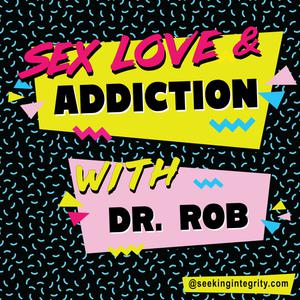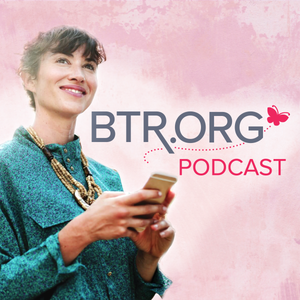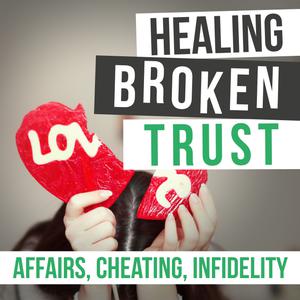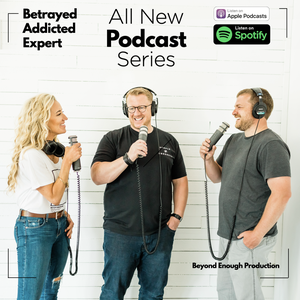
Sex, Love, and Addiction
Robert Weiss, PhD, MSW
- 48 minutes 23 secondsPart 2: Voices of Hope For, and By, Women Who Have Been Betrayed
Annie and Melissa are two women who have experienced deep marital betrayal in their relationship. The signs weren’t always clear as to what was actually going on, but when the wool had been pulled over their eyes, the amount of emotions, judgment, and pain they experienced took a long time to recover from. This episode is part two of these two women sharing their very personal story of how they found out about their husbands’ addictions and how they got through it.
TAKEAWAYS:
[3:15] Hindsight is 20/20. These are real and raw emotions and unfortunately, it’s difficult to hide or protect your children from what’s happening within your household.
[4:20] Melissa shares the reactions her friends and family had after they realized what was going on in her marriage.
[4:45] Annie found out that she had friends who loved her, but this topic was very difficult for them to handle.
[6:45] Did Annie’s husband’s porn use affect their intimate life?
[12:55] When Melissa joined a support group, it was the first time she felt validated and like she wasn’t going through this journey alone.
[23:45] Guess what, an addict can lie to their therapist! And some therapists eat it all up.
[30:50] Melissa knew for many years something was wrong but she just didn’t know what. Those years were painful; to constantly doubt herself.
[33:40] The work betrayed spouses have to go through to heal is very different from what an addict has to go through to make amends.
[39:15] How did Melissa and Annie meet? They’re so grateful for each other and their support!
RESOURCES:
Cruise Control: Understanding Sex Addiction in Gay Men
Prodependence: Moving Beyond Codependency
Out of the Doghouse by Robert Weiss
QUOTES:
-
“You trust your spouse and it’s something that you never expected to happen. I never expected to find what I found.”
-
“I knew my friends were trustworthy, but I couldn’t go to my friends and be like, ‘guess what I discovered now’. At least, I couldn’t.”
-
“I will never be grateful this happened to me, but I am grateful that because it happened to me, I have made life-long friends.”
16 March 2024, 2:34 am -
- 43 minutes 50 secondsPart 1: Voices of Hope For, and By, Women Who Have Been Betrayed
Annie and Melissa are two women who have experienced deep marital betrayal in their relationship. The signs weren’t always clear as to what was going on, but when the wool had been pulled over their eyes, the amount of emotions, judgment, and pain they experienced took a long time to recover from. These two women share their stories and also share why they decided to stay with their husbands and support them in their addiction.
TAKEAWAYS:
[2:15] Today we hear from two women who have gone through painful marital betrayal.
[2:45] Why did these two women agree to come on and share their painful story today?
[3:50] When Melissa first found out about the betrayal, she didn’t see light at the end of the tunnel. Today, she does.
[6:25] Melissa really felt like everything in her relationship was good…until it wasn’t.
[13:00] What made Melissa throw her husband out of the house?
[14:50] What is betrayal trauma and why do so many partners experience it after finding out about their spouses affairs?
[20:00] Why did Annie stay in her relationship?
[20:55] When discovery happened, Annie had been married nearly 29 years.
[27:25] Dr. Rob defines what ‘porn’ means these days. It’s not just looking at a naked image anymore!
[28:50] Guys look at porn, what’s the big deal?
[31:15] Melissa’s husband would minimize her concerns when he was ‘out late’. She knew something was wrong, but couldn’t quite put her finger on why or what.
[32:45] Melissa’s husband is now upset at himself that he missed so much of his children’s lives because of his addiction.
[36:40] Annie shares that when people found out about her husband’s addiction, all the attention went to him. That’s when she felt so alone.
[38:30] Annie felt a second betrayal from her husband’s CSAT. She was dismissed in her feelings and she had no support!
[40:40] Melissa knew in her gut that something was wrong, so she snooped through his phone. When she found out all the lies and betrayal, she screamed so loud at him that it woke her children up.
[41:15] Melissa found out that their couple’s therapist knew about some of his betrayals and kept this information from her. Dr. Rob said this behavior was a violation of trust for a couple’s therapist. If you’re a therapist, don’t do this!
RESOURCES:
Cruise Control: Understanding Sex Addiction in Gay Men
Prodependence: Moving Beyond Codependency
Out of the Doghouse by Robert Weiss
QUOTES:
-
“Anything that’s kept secret from the relationship is a betrayal. It doesn’t matter if it’s with a person or not. It’s all kept secrets and it’s all painful.”
-
“Decades ago, when women left their husbands, they were scorned. Now, when we stay, they don’t understand.”
-
“Just because he screws up doesn’t mean I’m going to throw my lift under a bus.”
15 March 2024, 2:27 am -
- 44 minutes 26 secondsGoing to Therapy Doesn’t Have to Be Impossible with Jason VanRuler
Jason VanRuler is a therapist, coach, speaker, and author dedicated to impacting those who make an impact. His first book, Get Past Your Past, is all about establishing a mindset of emotional health and resilience to find lasting wholeness. In this episode, Jason shares his personal self-development journey, why going to therapy is so difficult for so many people, and why our natural inclination is to hurt others; intentionally or not.
TAKEAWAYS:
[4:15] A little bit about Jason and how he became a therapist.
[10:10] Due to Jason’s rough upbringing, he knew he had to work on himself first before helping others.
[14:40] Jason explains the reason why he likes to host outdoor retreats and how it helps with the healing process.
[21:30] Best way to change your past and maladaptive behaviors is by surrounding yourself with different people.
[22:05] It’s important to be honest with yourself and really benchmark where you’re currently are.
[25:15] The more successful we get, the less likely we become surrounded by people who tell us the truth.
[30:15] Therapists are truth tellers and this is why going to therapy is so hard.
[37:45] There was a time in Jason’s life where going to therapy seemed impossible.
[38:45] What can we do today that empowers a better story?
[40:45] Have a question for Jason? Reach out!
RESOURCES:
Cruise Control: Understanding Sex Addiction in Gay Men
Prodependence: Moving Beyond Codependency
Out of the Doghouse by Robert Weiss
QUOTES:
-
“We aspire to have something that only a different community will give us. If don’t have a different community, our current one just keeps us in the same spot.”
-
“Be honest with where you’re at. So many times we fantasize how we want it to look.”
-
“I think people always hurt people. Always. I don’t think people have gotten out of life without hurting other people, sometimes it’s intentional and sometimes it’s not. ”
15 February 2024, 2:00 pm -
- 27 minutes 7 secondsPart 2: Porn, What’s The Big Deal? with Dr. Sandra Shachar
Sandra A. Shachar, Ph.D., is a Licensed Psychologist in Philadelphia, Pennsylvania, and has over thirty years of clinical experience working with individuals, couples and families affected by Betrayal Trauma. She is also the author of The Porn Solution, which dives into the world of betrayal through porn use and what partners can do to navigate themselves through it. In this episode, Dr. Sandra talks about PTSD, intentional listening to your partner, and how to regain your partner’s trust.
TAKEAWAYS:
[1:50] How could I compete with a porn star?
[3:40] Women feel like if he’s watching porn, he’s checked out of the relationship.
[5:05] Can this sort of betrayal cause PTSD? Dr. Sandra believes so.
[11:40] How can you create meaningful dialogue when talking about something so difficult?
[14:20] You can create intentional listening while putting ‘guard rails’ on it.
[15:25] If your relationship is in crisis right now, it’s going to be okay. It doesn’t mean that’s where you’re going to end up.
[19:10] How can you rebuild trust again?
[25:30] If you have children, the reason to heal your relationship should be at the forefront of your mind.
RESOURCES:
Cruise Control: Understanding Sex Addiction in Gay Men
Prodependence: Moving Beyond Codependency
Out of the Doghouse by Robert Weiss
QUOTES:
-
“We depend on other human beings for our very survival. In order to survive as a human being, we need intimate connection with at least one other human being.”
-
“What matters most in an intimate relationship is to feel seen, heard, and understood by your partner.”
-
“If you have children, this affects them. The keeping of secrets, they feel all of that.”
8 February 2024, 7:56 pm -
- 34 minutes 32 secondsPart 1: Porn, What’s The Big Deal? with Dr. Sandra Shachar
Sandra A. Shachar, Ph.D., is a Licensed Psychologist in Philadelphia, Pennsylvania, and has over thirty years of clinical experience working with individuals, couples and families affected by Betrayal Trauma. She is also the author of The Porn Solution, which dives into the world of betrayal through porn use and what partners can do to navigate themselves through it. In this episode, Dr. Sandra talks about the definition of betrayal, why porn affects so many people, and why it’s okay to ask for your needs to be met.
TAKEAWAYS:
[3:20] Is porn cheating?
[3:55] Why did Dr. Sandra write the book, The Porn Solution?
[7:10] What is the definition of a betrayal?
[12:05] Porn, what’s the big deal? I’m not cheating on you!
[18:10] Why does porn betrayal affect women so deeply?
[22:35] How can we regain a partner’s trust after a betrayal?
[24:30] You have a right to ask for your needs to be met. It’s okay to have needs!
[29:15] What is a problem for one person, is a problem for both people.
[29:55] Porn isn’t the issue, it’s the trust!
RESOURCES:
Cruise Control: Understanding Sex Addiction in Gay Men
Prodependence: Moving Beyond Codependency
Out of the Doghouse by Robert Weiss
QUOTES:
-
“When I talk to spouses about their experience of whether porn felt like a betrayal to the relationship, we got up to 80%. We have a population of female spouses who say it’s a big deal.”
-
“It’s not the act of what you’re doing specifically, it’s the deception. It’s what you’ve hidden me that constitutes as the betrayal.”
-
“It makes absolute sense why you’re reacting the way you are. This is normal under these abnormal circumstances.”
1 February 2024, 7:50 pm -
- 33 minutes 1 secondBONUS: Why Should I Write Down All My Anger and Hurt?
Dr. Rob and Tami talk about the healing properties a journal practice can have. A listener wrote that her therapist wants her to journal out the resentment and anger that her SA has caused her, but the mere thought of doing this gets her re-triggered and angry all over again. Is there really a point to all of this aside from re-remembering the betrayal?
TAKEAWAYS:
[:25] My SA husband’s entire family has suffered from some sort of sexual addiction or abuse. Is all of this hereditary?
[8:30] How can intermittent reward cause or enhance relationship addiction?
[16:15] What’s the point of writing my betrayal down? I feel so angry just thinking about it.
[18:50] If you have a lot of anger inside you, a journal practice can be very healing.
[19:45] My addict is weaseling out of our initial agreement. What should I do?
[26:05] If you’re not doing the work, then it doesn’t matter what you say or do.
[26:15] He’s sober but still can’t be intimate with me. He says he feels shame. Is this just an excuse?
RESOURCES:
Email Tami: [email protected]
4 January 2024, 5:00 am - 33 minutes 17 secondsBONUS: Am I Just Having Fun, or Is This a Full-Blown Addiction?
Dr. Rob and Tami break down the gray area between just having fun, being “at-risk” for an addiction, and being a full-blown addict. It can be difficult to define the line fully when you’re in the middle of a “good time.” Dr. Rob offers various considerations for you to think about to determine whether you’re barely teetering the line or if you’re in a bad and unsustainable place.
TAKEAWAYS:
[:35] I believe my partner is a narcissist and a sex addict. He’s hurting me but I can’t seem to walk away. How can I just leave him?
[8:40] Have a three-circle plan! You need a healthy plan that will value you.
[10:50] Can you become addicted to friendships?
[15:50] My betrayed partner doesn’t believe me anymore, even when I’m telling her the truth. Do I just agree with her?
[22:30] Is there an in-between stage where someone can be between “at-risk” for an addiction vs. being a complete addict?
[26:55] Do I need to do yet another formal disclosure with my addict? We just don’t have the money for another therapist right now.
RESOURCES:
Email Tami: [email protected]
Prodependence: Moving Beyond Codependency, by Robert Weiss
Sex Addiction 101: A Basic Guide to Healing from Sex, Porn, and Love Addiction, by Robert Weiss
Cruise Control: Understanding Sex Addiction in Gay Men, by Robert Weiss
21 December 2023, 3:48 pm - 53 minutes 34 secondsDiscover and Connect with Your Own Inner Voice Again with Lucy Beresford
Lucy Beresford hosts LBC Radio’s Sex and Relationships show and she’s the author of 4 books, including the global best-seller Happy Relationships. She works as a psychotherapist at The Grace Clinic, London and from time to time at The Delhi Psychiatry Centre in India under Dr. Sunil Mittal. In this episode, Lucy talks about refinding your voice again after a betrayal, how to create a deeper connection with a partner, and what are the steps forward if you continue to stay in a marriage that had a betrayal in it.
TAKEAWAYS:
[5:00] Lucy shares a time where she lost her voice and had to rediscover it again.
[6:10] How can you show up for yourself? How can you own your own voice?
[7:30] What does Lucy mean to ‘have a voice’?
[10:15] It’s very hard for women who have experienced betrayal to have a voice.
[12:10] When women get into relationships, their sense of self often gets drowned out.
[19:40] It’s so hard to stay committed to someone when you’ve had a small fight; much less a betrayal.
[24:50] Unfortunately for addicts, they’ve hurt their best friend and partner and so they can not depend on this person (right now) for emotional support.
[31:10] What do we unwillingly enable in someone else because of our own baggage and history?
[34:35] You’ve consciously chosen to stay, now what?
[40:45] Lucy talks about disclosed non-monogamy and what that means for a couple.
[46:15] If your personality is being crushed and you’re becoming a former version of yourself, when should you stop everything and listen?
[50:00] A little bit about Lucy and her work/books.
RESOURCES:
Cruise Control: Understanding Sex Addiction in Gay Men
Prodependence: Moving Beyond Codependency
Out of the Doghouse by Robert Weiss
QUOTES:
-
“I didn’t know I had permission not to have children. It showed me there are people out there who are making choices in their life for other people.”
-
“What’s the impact of you living authentically? It’s one thing to be sad about the life you had, it’s another to assist in that sadness.”
-
“How do I retain a sense of me while celebrating and nourishing ‘we’?”
30 November 2023, 8:56 pm -
- 46 minutes 1 secondHow to Heal After a Betrayal: Dr. Monique Thompson on Navigating Infidelity
Dr. Monique Thompson is a Psychotherapist in Dallas, Texas. She has seen over 1,000 couples in her counseling practice over the years and now shares tips and tools for couples to help recover from infidelity. She recently wrote a workbook for couples who are looking to recover from infidelity and shares her industry insights with Dr. Rob on today’s episode. After infidelity, many couples are unconsciously going to war with one another. Dr. Monique shares how you can get back to peaceful territory once again.
TAKEAWAYS:
[3:40] Why did Dr. Monique decide to write a book about infidelity recovery?
[7:20] What responsibilities or accountability should the non-affair partner take on?
[10:55] When you choose to stay, you have to mentally keep in mind you’re going to war. You’re no longer in a time of peace.
[11:25] Some couples never consciously choose to stay. They just didn’t get divorced and that is not the same.
[15:35] Why did Dr. Monique write the Infidelity Recovery Workbook for Couples?
[20:30] Your own healing comes from a place of healing within yourself. Your partner won’t be able to help you with that.
[24:30] Are you compelled to set down ultimatums in hopes your partner will change?
[32:25] Dr. Monique shares why it’s important to take a deep breath in and reset your mindset.
[36:00] Sometimes people cheat because they can’t be themselves. What happens when someone finally reveals their ‘true’ persona and their partner still wants to leave?
[39:55] Does Dr. Monique have a different approach for a young couple vs. an older couple?
RESOURCES:
Cruise Control: Understanding Sex Addiction in Gay Men
Prodependence: Moving Beyond Codependency
Out of the Doghouse by Robert Weiss
Infidelity Recovery Workbook for Couples
QUOTES:
-
“If you’re choosing to stay, you’re choosing to go off to war. You’re not at home during peace time.”
-
“Sometimes, people really didn’t choose to stay, they just didn’t get a divorce. That’s not the same.”
-
“I ask couples if they are willing to set a peace treaty down for a period of time to be able to begin the work.”
16 November 2023, 8:54 pm -
- 55 minutes 26 secondsFoundation of Hope: The 12 Steps Way to Healing from Trauma with Dr. Jamie Marich and Dr. Stephen Dansiger
Dr. Jamie Marich is a facilitator of transformative experiences. A clinical trauma specialist, expressive artist, writer, yoga teacher, performer, short filmmaker, Reiki master, TEDx speaker, and recovery advocate. Marich has taught conscious dance seminars at various conferences nationally, internationally, and online, and has trained more than 500 facilitators in the Dancing Mindfulness practice. She is also the author of several books including the original Trauma and the 12 Steps.
Dr. Stephen Dansiger is a master EMDR therapist and provider of EMDR Basic Training and Advanced Topics Courses with the Institute for Creative Mindfulness, and has helped set up the premiere Buddhist addictions rehab center, Refuge Recovery Centers. He has been practicing Buddhist mindfulness for almost 30 years (including a one year residency at a Zen monastery), and teaches dharma classes regularly in Los Angeles and other centers internationally.
TAKEAWAYS:
[3:40] Why did Dr. Jamie and Dr. Stephen write a Trauma and the 12 Steps workbook?
[6:40] Dr. Jamie loves writing books because it’s accessible for everyone, especially those who might not be able to afford therapy.
[7:35] What made Dr. Stephen excited to collaborate with Dr. Jamie?
[11:55] How do people heal their trauma while they’re also reliving it?
[13:40] What is the greatest gift about being a therapist specializing in trauma?
[17:00] Why throw 12-step practices into this mix of trauma and healing?
[21:00] People enjoy the structure that 12 Steps brings and it makes it easier for them to follow a healing journey if they know what to expect.
[30:00] Dr. Jamie talks about Step 6 and how it can perpetuate feelings of shame.
[33:40] Now that you know about your trauma, what are the next steps? It’s important not to fall into a victim mindset.
[43:30] What is mindfulness, really?
[47:55] Many people who have come into a 12-step program have been wounded by God, and end up missing out on a wealth of knowledge and healing.
[50:20] What books should you start with first?
RESOURCES:
Cruise Control: Understanding Sex Addiction in Gay Men
Prodependence: Moving Beyond Codependency
Out of the Doghouse by Robert Weiss
QUOTES:
-
“There is not a separation between trauma therapy and 12 Steps, and Buddhist practice. It all goes together.”
-
“Hurt people hurt people, but how I really like to reframe that is trauma is this phononym where you can bleed all over each other.”
-
“Yes I am responsible for adult behavior but I am not a bad person. I wasn’t responsible for what happened to me, but how I learned to adapt and survive, I am responsible for.”
28 September 2023, 4:06 am -
- 31 minutes 25 secondsPart 2: Couples, Conflict and Resolution with Dr. Stan Tatkin
Dr. Stan Tatkin, PsyD, MFT, is a clinician, researcher, teacher, and developer of A Psychobiological Approach to Couples Therapy® (PACT). He has a clinical practice in Calabasas, CA, and developed the PACT Institute for the purpose of training other psychotherapists to use this method in their clinical practice. In this episode, Dr. Stan discusses the 5 things that break a relationship apart, how to recover from a betrayal, and how to live a pro-relationship life.
TAKEAWAYS:
[1:45] How do you recover from a betrayal?
[6:00] In a society, we are forced to grow up for the betterment of our tribe.
[7:25] What do couples complain the most about?
[11:25] People will commit the same mistakes over and over because they don’t understand the internal errors that they’re making.
[15:25] What happens if you’re stuck in a relationship ‘role’ that you don’t like?
[18:20] What does it mean to be pro-relationship?
[20:35] Your attachment needs are not rooted in love. Dr. Stan explains why.
[26:00] Want to know more about Dr. Stan? Link in the show notes!
RESOURCES:
Cruise Control: Understanding Sex Addiction in Gay Men
Prodependence: Moving Beyond Codependency
Out of the Doghouse by Robert Weiss
In Each Other’s Care by Dr. Stan Tatkin
QUOTES:
-
“There are cultures where it’s emphatically insistent and people do grow up because the culture demands that you operate with each other.”
-
“We do the same things that mess up relationships, no matter what kind of relationships they are, and we always will if we don’t understand our nature.”
-
“Everything I am talking about is inline with being selfish. Being pro-relationship is being pro-self. They are one and the same.”
7 September 2023, 4:00 am -
- More Episodes? Get the App
Your feedback is valuable to us. Should you encounter any bugs, glitches, lack of functionality or other problems, please email us on [email protected] or join Moon.FM Telegram Group where you can talk directly to the dev team who are happy to answer any queries.
 The BTR.ORG Podcast - Betrayal Trauma Recovery
The BTR.ORG Podcast - Betrayal Trauma Recovery
 Healing Broken Trust In Your Marriage After Infidelity
Healing Broken Trust In Your Marriage After Infidelity
 The Betrayed, The Addicted, The Expert
The Betrayed, The Addicted, The Expert
 Beyond Bitchy: Mastering the Art of Boundaries
Beyond Bitchy: Mastering the Art of Boundaries
 Helping Couples Heal Podcast
Helping Couples Heal Podcast
 Sexual Addiction:Strength/Hope/Recovery
Sexual Addiction:Strength/Hope/Recovery